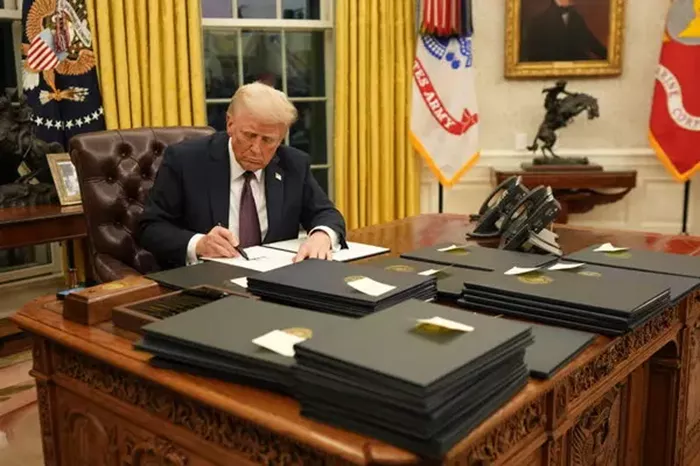The Trump administration’s tariff policies, designed to bolster U.S. manufacturing and impose punitive measures on China, have significantly disrupted global supply chains, including those in the oilfield services (OFS) sector. While the direct effects on the Middle East and North Africa (MENA) region have been indirect, the region stands to benefit from these disruptions—if operators and service companies take strategic action to adjust their procurement practices.
The most impactful of the U.S. tariff changes have been revisions to steel duties, which have removed country-based quotas and exemptions. These tariffs impose a minimum 10% fee on imports, with rates as high as 125% for goods sourced from China. The new fees have complicated the sourcing of essential oilfield materials such as oil country tubular goods (OCTG), line pipe, drill pipe, and artificial lift systems. While some categories have seen marginal cost increases, others are experiencing dramatic price hikes, which are affecting U.S.-based exploration and production companies (E&Ps) and service providers.
In response, many U.S. companies are shifting their sourcing to lower-tariff nations, such as India, or ramping up domestic manufacturing to avoid tariff-induced costs. Some are also stockpiling materials when tariff rates are temporarily reduced. However, these disruptions have created opportunities for MENA-based oilfield service providers. Regional players, such as TAQA, NESR, ADES, and Arabian Drilling, are well-positioned to take advantage of these shifts in global supply chains.
The MENA region’s oilfield service providers benefit from more localized supply chains and maintenance operations, which offer greater resilience compared to the globally dispersed networks of international competitors. As global suppliers contend with increased geopolitical tensions and trade conflicts, MENA-based companies can navigate these challenges more effectively due to their proximity to key clients and their ability to guarantee faster delivery times. This not only reduces the risk of project delays but also positions MENA companies to secure more profitable contracts, as they can offer shorter lead times and avoid costly non-productive time.
For MENA operators, these market dynamics present an opportunity to negotiate more favorable pricing and offset the impact of fluctuating oil prices. Reduced pricing has become a prevailing trend in the region’s OFS sector, leading to the issuance of several lump-sum turnkey (LSTK) contracts, such as those awarded to Sinopec and SLB in Kuwait. Additionally, major projects, like a proposed 80-well campaign in Jordan, are further demonstrating the growing appeal of the MENA OFS market.
National oil companies (NOCs) in the region, including ADNOC and Saudi Aramco, are increasingly adopting integrated service contracts as a way to streamline operations and reduce costs. ADNOC, for instance, has ramped up its use of integrated service contracts from 35% in 2022 to 47% in 2025, while Saudi Aramco has also expanded its use of this model to improve operational efficiency.
Notably, while the U.S. tariffs have placed pressure on some oilfield service providers, they have not negatively impacted the MENA rig market, which has remained relatively stable. Saudi Aramco’s continued investment in its Jafurah field, along with ADES securing a ten-year, $291 million contract with the company, further underscores the region’s ongoing growth despite global supply chain disruptions.
The most significant long-term impact of the tariffs may be the acceleration of localization programs in the MENA region. Saudi Arabia’s In-Kingdom Total Value Add (IKTVA) and the UAE’s In-Country Value (ICV) programs, which aim to boost domestic content in energy sector procurement, are gaining traction as a result of the global supply chain disruptions. These programs are proving beneficial for both local players and multinational firms that have established manufacturing facilities in the region. Companies such as Baker Hughes, Schlumberger, and Halliburton, which have localized their operations, are benefiting from preferential treatment in tender evaluations and increased visibility into bid pipelines.
As the global oilfield services landscape continues to evolve, MENA-based companies with strong regional manufacturing and service capabilities are emerging as key players, poised to take advantage of the changing dynamics. With the U.S. tariff regime reshaping global supply chains, regional service providers are becoming increasingly insulated from global trade disruptions, further solidifying the MENA region’s role as a key hub in the oil and gas industry.


